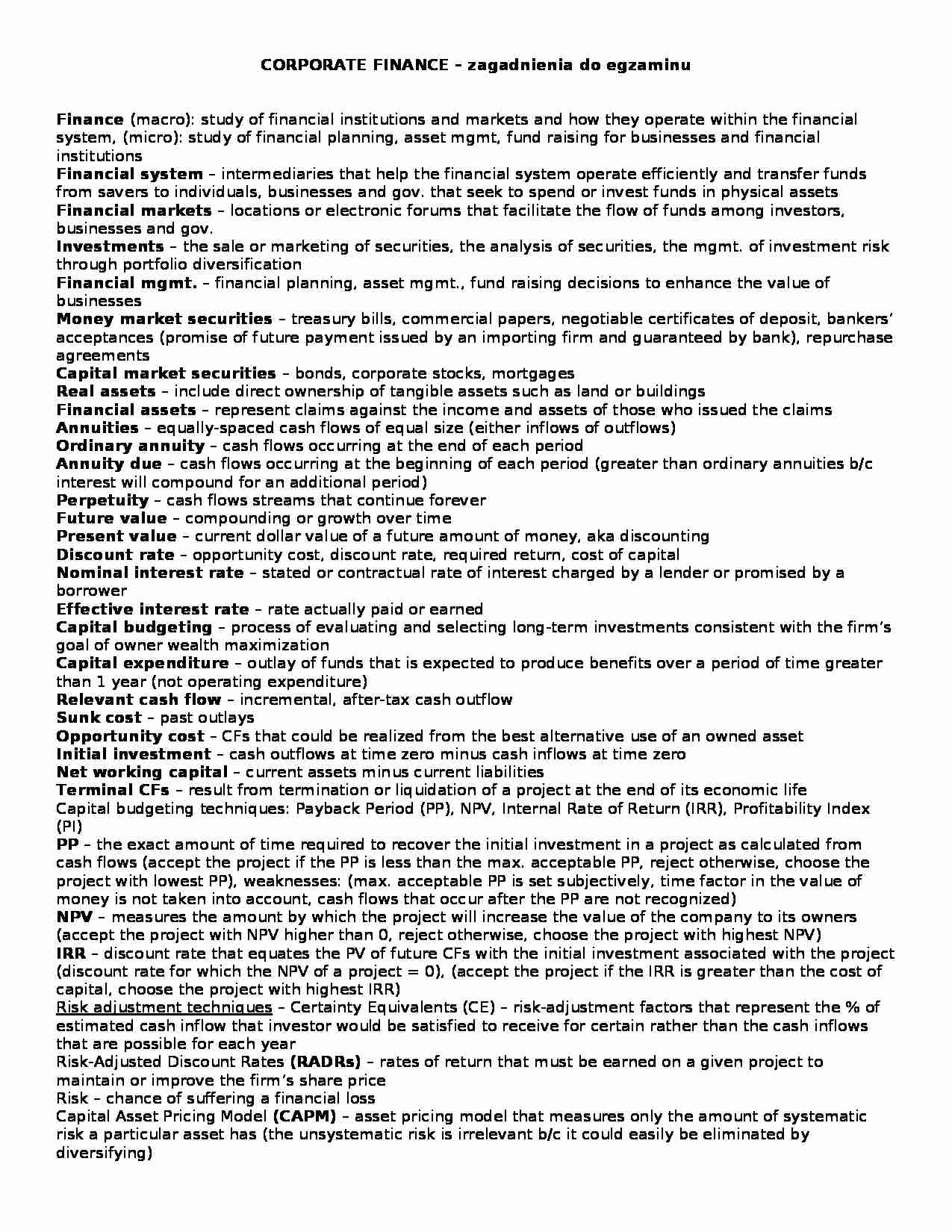To tylko jedna z 4 stron tej notatki. Zaloguj się aby zobaczyć ten dokument.
Zobacz
całą notatkę



CORPORATE FINANCE - zagadnienia do egzaminu Finance (macro): study of financial institutions and markets and how they operate within the financial system, (micro): study of financial planning, asset mgmt, fund raising for businesses and financial institutions
Financial system - intermediaries that help the financial system operate efficiently and transfer funds from savers to individuals, businesses and gov. that seek to spend or invest funds in physical assets
Financial markets - locations or electronic forums that facilitate the flow of funds among investors, businesses and gov.
Investments - the sale or marketing of securities, the analysis of securities, the mgmt. of investment risk through portfolio diversification
Financial mgmt. - financial planning, asset mgmt., fund raising decisions to enhance the value of businesses
Money market securities - treasury bills, commercial papers, negotiable certificates of deposit, bankers' acceptances (promise of future payment issued by an importing firm and guaranteed by bank), repurchase agreements
Capital market securities - bonds, corporate stocks, mortgages
Real assets - include direct ownership of tangible assets such as land or buildings
Financial assets - represent claims against the income and assets of those who issued the claims
Annuities - equally-spaced cash flows of equal size (either inflows of outflows)
Ordinary annuity - cash flows occurring at the end of each period
Annuity due - cash flows occurring at the beginning of each period (greater than ordinary annuities b/c interest will compound for an additional period)
Perpetuity - cash flows streams that continue forever
Future value - compounding or growth over time
Present value - current dollar value of a future amount of money, aka discounting
Discount rate - opportunity cost, discount rate, required return, cost of capital
Nominal interest rate - stated or contractual rate of interest charged by a lender or promised by a borrower
Effective interest rate - rate actually paid or earned
Capital budgeting - process of evaluating and selecting long-term investments consistent with the firm's goal of owner wealth maximization
Capital expenditure - outlay of funds that is expected to produce benefits over a period of time greater than 1 year (not operating expenditure)
Relevant cash flow - incremental, after-tax cash outflow
Sunk cost - past outlays
Opportunity cost - CFs that could be realized from the best alternative use of an owned asset
Initial investment - cash outflows at time zero minus cash inflows at time zero
Net working capital - current assets minus current liabilities
(…)
… ratio indicates the degree of confidence that investors have in the firm's future performance (P/E=market price per share of common stock/eps)
Financial Planning Process - planning that begins with long-term (strategic) financial plans that in turn guide the formulation of short-term operating plans and budgets (2 aspects: cash planning (preparation of firm's cash budget), profit planning. Working…
…-term financing: specific assets pledged as collateral (inventory, accounts receivable), security agreement between lender and borrower, collateral can reduce losses if the borrower defaults
Types of mergers: horizontal (involves 2 firms in the same line of business), vertical (between firms at different stages of production chain - expansion back towards the source of raw materials, or expansion…
... zobacz całą notatkę






Komentarze użytkowników (0)